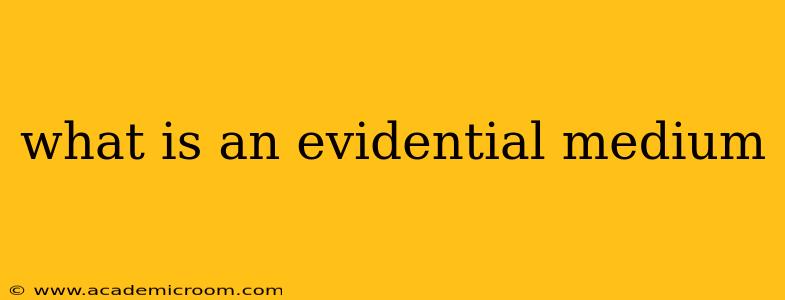What is an Evidential Medium?
An evidential medium claims the ability to communicate with spirits and provide verifiable evidence of their existence. Unlike many mediums who focus on comfort and emotional connections with the deceased, evidential mediums prioritize concrete proof. This proof might take the form of specific details about the deceased that the medium couldn't possibly know beforehand, demonstrating a genuine connection to the spirit world. The credibility of an evidential medium hinges entirely on the validity and verifiability of this evidence.
It's crucial to understand that the existence and abilities of evidential mediums are highly debated. Skeptics often attribute successful readings to cold reading, psychological manipulation, or coincidence. Proponents, however, believe in the genuine ability of these individuals to tap into a spiritual realm and relay information from beyond.
What Makes Evidence "Evidential"?
The key differentiating factor for evidential mediumship lies in the nature of the evidence provided. It's not enough to simply offer general statements about sadness, loss, or a loved one's personality. Truly evidential information would include:
- Specific names, dates, and locations: Details that are unique to the deceased and unlikely to be guessed. For example, mentioning a specific street name where the deceased lived, a unique childhood pet's name, or a significant date related to a little-known event in their life.
- Unusual or obscure details: Information that is unlikely to be commonly known or easily researched. This strengthens the argument that the medium obtained the information from a supernatural source.
- Verifiable information: Ideally, the evidence should be independently verifiable through family members or records. This eliminates the possibility of the medium having pre-existing knowledge.
- Information the sitter doesn't know: The information revealed should be unknown to the person requesting the reading.
How Do Evidential Mediums Work (According to Believers)?
Proponents of evidential mediumship propose various mechanisms by which mediums supposedly receive information:
- Spirit communication: The most straightforward explanation is direct communication with the spirits of the deceased. They claim the medium acts as a conduit, receiving messages and relaying them to the living.
- Psychic abilities: Some suggest the medium possesses psychic abilities, allowing them to access information from the deceased's energy or psychic imprint.
- Subconscious perception: A more nuanced view suggests the medium taps into the subconscious knowledge of the sitter, picking up on subtle cues and hints to construct seemingly evidential information. While this explanation is often favored by skeptics, it doesn't fully explain instances where verifiable information unknown to the sitter is revealed.
Are Evidential Mediums Real? What are the Criticisms?
The reality of evidential mediumship remains highly contested. Skepticism often stems from:
- Cold reading: A technique where mediums use general statements and observation skills to gather information about a sitter, creating an illusion of psychic abilities.
- Hot reading: Gathering information beforehand, such as researching the client or using confederates to obtain details.
- Suggestibility and confirmation bias: Sitters may interpret ambiguous information as evidence, confirming their beliefs even if the connection is tenuous.
- Coincidence: Some successful readings may be pure coincidence, with seemingly specific details arising from chance.
- Lack of rigorous scientific testing: Controlled scientific studies on evidential mediumship are rare and often criticized for methodological flaws.
Ultimately, whether one believes in the existence and abilities of evidential mediums is a matter of personal belief. While some claim to have experienced compelling evidence, critical analysis and skepticism remain crucial in evaluating these claims. The burden of proof rests on demonstrating the validity and impossibility of alternative explanations for the purported evidence.
